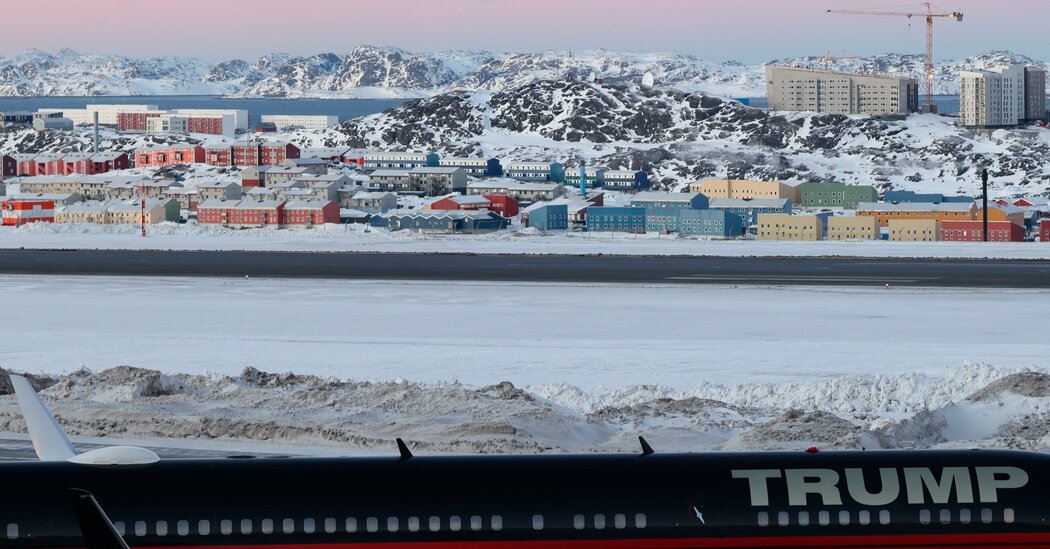
It was a contentious, aggressive telephone call, five days before the inauguration of President Trump on Jan. 20.
Speaking to Prime Minister Mette Frederiksen of Denmark, Mr. Trump insisted he wanted the United States to take over Greenland, the massive and autonomous Danish island that occupies a strategic part of the ocean as the ice caps melt and new shipping lanes open up.
The tone and content of the icy exchange was described by two European officials who were briefed on the 45-minute call and requested anonymity because of the sensitivity of the topic. The United States has not publicly commented on the call.
Ms. Frederiksen made various suggestions for more cooperation on military and economic issues, but insisted that Greenland, which already hosts an important American base, was not for sale, according to the European officials.
Since that Jan. 15 call, whose aggressive tenor was earlier reported by The Financial Times, Denmark has tried to calm the waters, urging its partners in the European Union not to inflame the situation until matters become more clear, the officials said. The issue of Greenland is not on the agenda for an E.U. foreign affairs council meeting in Brussels on Monday, for example.
If Mr. Trump decides to pressure Denmark with economic means, through tariffs, the European Union itself would be expected to respond as a whole with countertariffs, said Zaki Laïdi, a professor at Sciences Po and an adviser to the former E.U. foreign policy chief, Josep Borrell Fontelles.
“I was told that Trump is quite serious about Greenland, and it’s going to be a huge challenge for the E.U., if we don’t react strongly to it,” Mr. Laïdi said. He confirmed that “the Danes are saying, ‘Keep it down,’ but they’re scared.”
That sense of foreboding was obvious in Davos, Switzerland, where European leaders gathered last week with corporate executives and academics for the World Economic Forum’s annual meeting. Rumors about Mr. Trump’s call with Ms. Frederiksen were rampant at the gathering, as was nervousness about what a second Trump administration will mean for Europe as a whole.
For now, the Danes are concentrating on dialogue. On Friday, Lars Lokke Rasmussen, Denmark’s foreign minister and prime minister during the first Trump administration, had a 20-minute telephone discussion with the United States new secretary of state, Marco Rubio. Afterward, Mr. Rasmussen said that the two countries had agreed to discuss “the Arctic region” and that the conversation, which included other issues like Ukraine, had a “good and constructive tone.”
The State Department, for its part, said that Mr. Rubio had “reaffirmed the strength of the relationship” between the two countries. The two men, the State Department said, “discussed the importance of deepening bilateral and regional cooperation on security and defense, economic and trade matters, and ending the war in Ukraine.”
Officially, Denmark has said little about the phone call between Mr. Trump and Ms. Frederiksen. A statement from Ms. Frederiksen’s office immediately afterward made no mention of sharp disagreements but emphasized trade with the United States and talked of cooperation, dialogue and enhanced investment in security by Denmark.
“In the conversation, the Prime Minister emphasized the importance of strengthening security in the Arctic, and that the Kingdom of Denmark is ready to shoulder even greater responsibility for this,” the statement said. In the statement, Ms. Frederiksen cited the chairman of the Greenlandic Parliament, Mute Egede, saying that Greenland is not for sale and argued that “it is up to Greenland itself to make a decision on independence.”
The officials who were briefed on the phone call and Mr. Laïdi suggested that Mr. Trump’s intentions were unclear, and that he might move to encourage Greenlanders to vote for independence in a referendum and then to bind themselves to the United States. Or he may want to pressure Denmark and the European Union with tariffs. Brussels is working with the Danes to strike the right tone and to figure out what Mr. Trump really wants, one official said.
In a response to questions on Sunday, the Danish prime minister’s office said it did “not recognize the interpretation of the conversation given by anonymous sources.”
Under a 2009 agreement with Denmark, Greenland can declare independence only after a successful referendum — which Mr. Egede has suggested might be held in tandem with the island’s upcoming parliamentary election in April.
Mr. Trump has called U.S. control over Greenland “an absolute necessity” for Western security, and on Saturday, in a gaggle with reporters, said “I think we’re going to have it.”
Friis Arne Petersen, a former Danish ambassador to Washington, said that “Europe, Greenland and the rest of the world must take Donald Trump’s statements very seriously, because they were carefully prepared.”
“The terms used and their context left no room for interpretation,” he said in an interview with the French newspaper Le Figaro. Mr. Trump’s interest in Greenland was more commercial in his first term — when he first offered to buy it — but is now predominantly about security, Mr. Petersen said.
The issue of Greenland “is of the utmost importance to the E.U.,” Mr. Laïdi said. “Our credibility is at stake. The Danish want to keep a low profile but that’s not the way the world works.”
Greenland, with a population of around 60,000, was a Danish colony until it became self-ruling with its own Parliament in 1979. It remains a territory of Denmark, with Copenhagen exercising control over its foreign and defense policy.







